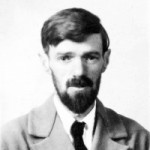Be still when you have nothing to say; when genuine passion moves you, say what you’ve got to say, and say it hot.
D. H. Lawrence Quotes
Showing all text quotes-
This is what I believe:
That I am I.
That my soul is a dark forest.
That my known self will never be more than a little clearing in the forest.
That gods, strange gods, come forth from the forest into the clearing of my known self, and then go back.
That I must have the courage to let them come and go.
That I will never let mankind put anything over me, but that I will try always to recognize and submit to the gods in me and the gods in other men and women.
There is my creed.Topics in Uncategorized -
I am part of the sun as my eye is part of me. That I am part of the earth my feet know perfectly, and my blood is part of the sea. There is not any part of me that is alone and absolute except my mind, and we shall find that the mind has no existence by itself, it is only the glitter of the sun on the surfaces of the water.
Topics in Nature

| Birth: | 11th September, 1885 |
| Death: | 2nd March, 1930 |
| Nationality: | British |
| Profession: | Novelist |
He was born, in Eastwood, 8a Victoria Street, is now the D.H. Lawrence Birthplace Museum. The young Lawrence attended Beauvale Board School from 1891 until 1898, becoming the first local pupil to win a County Council scholarship to Nottingham High School in nearby Nottingham. He left in 1901, working for three months as a junior clerk at Haywood's surgical appliances factory, but a severe bout of pneumonia, reportedly the result of being accosted by a group of factory girls , ended this career.
In the years 1902 to 1906 Lawrence served as a pupil teacher at the British School, Eastwood. He went on to become a full-time student and received a teaching certificate from University College, Nottingham, in 1908. During these early years he was working on his first poems, some short stories, and a draft of a novel, Laetitia, that was eventually to become The White Peacock. At the end of 1907 he won a short story competition in the Nottingham Guardian, the first time that he had gained any wider recognition for his literary talents.
In the autumn of 1908 the newly qualified Lawrence left his childhood home for London. While teaching in Davidson Road School, Croydon, he continued writing. Some of the early poetry, submitted by Jessie Chambers, came to the attention of Ford Madox Ford, then known as Ford Hermann Hueffer and editor of the influential The English Review. In 1911 Lawrence was introduced to Edward Garnett, a publisher's reader, who acted as a mentor, provided further encouragement, and became a valued friend, as Garnett's son David was also. Throughout these months the young author revised Paul Morel, the first draft of what became Sons and Lovers.
Lawrence continued to write despite his failing health. In his last months he wrote numerous poems, reviews and essays, as well as a robust defence of his last novel against those who sought to suppress it. His last significant work was a reflection on the Book of Revelation, Apocalypse. After being discharged from a sanatorium, he died at the Villa Robermond in Vence, France, from complications of tuberculosis.
Related Authors
Advertisement
Today's Anniversary - 15th January
Births
- 1915 - Alan Lomax
- 1914 - Etty Hillesum
- 1850 - Sofia Kovalevskaya
- 1913 - Lloyd Vernet Bridges Jr.
- 1902 - Nazim Hikmet
Deaths
- 1987 - Ray Bolger
- 1896 - Mathew B. Brady
- 1983 - Meyer Lansky
- 2005 - Victoria De Los Angeles
- 1996 - Les Baxter
Quote of the day
Popular Topics
About Quoteswave
Our mission is to motivate, boost self confiedence and inspire people to Love life, live life and surf life with words.



Share with your friends